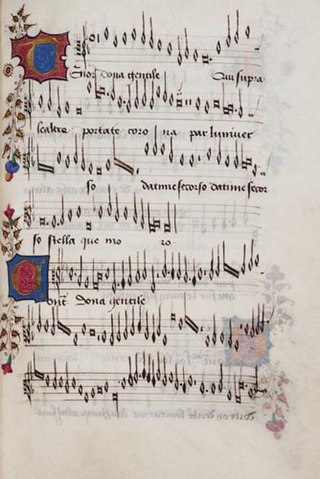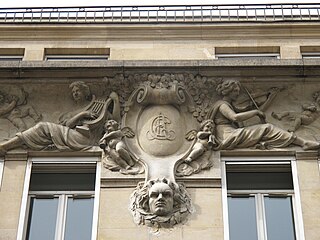Related Research Articles

The American Society of Composers, Authors, and Publishers (ASCAP) is an American not-for-profit performance-rights organization (PRO) that collectively licenses the public performance rights of its members' musical works to venues, broadcasters, and digital streaming services.
SACD, founded as Société des Auteurs et Compositeurs Dramatiques on 7 March 1829, is a French collecting society, undertaking collective rights management for authors. The Society manages, promotes and protects the performance rights of theatrical, audiovisual or photographic works for their creators by collecting royalties and authorising performances. It's also one of the main lobbies against "droit d'auteur" (copyright) changes and to protect the activities of collective rights management societies.
Copyrights can either be licensed or assigned by the owner of the copyright. A copyright collective is a non-governmental body created by copyright law or private agreement which licenses copyrighted works on behalf of the authors and engages in collective rights management. Copyright societies track all the events and venues where copyrighted works are used and ensure that the copyright holders listed with the society are remunerated for such usage. The copyright society publishes its own tariff scheme on its websites and collects a nominal administrative fee on every transaction.
A performance rights organisation (PRO), also known as a performing rights society, provides intermediary functions, particularly collection of royalties, between copyright holders and parties who wish to use copyrighted works publicly in locations such as shopping and dining venues. Legal consumer purchase of works, such as buying CDs from a music store, confer private performance rights. PROs usually only collect royalties when use of a work is incidental to an organisation's purpose. Royalties for works essential to an organisation's purpose, such as theaters and radio, are usually negotiated directly with the rights holder. The interest of the organisations varies: many have the sole focus of musical works, while others may also encompass works and authors for audiovisual, drama, literature, or the visual arts.
A royalty payment is a payment made by one party to another that owns a particular asset, for the right to ongoing use of that asset. Royalties are typically agreed upon as a percentage of gross or net revenues derived from the use of an asset or a fixed price per unit sold of an item of such, but there are also other modes and metrics of compensation. A royalty interest is the right to collect a stream of future royalty payments.
APRA AMCOS consists of Australasian Performing Right Association (APRA) and Australasian Mechanical Copyright Owners Society (AMCOS), both copyright management organisations or copyright collectives which jointly represent over 100,000 songwriters, composers and music publishers in Australia and New Zealand. The two organisations work together to license public performances and administer performance, communication and reproduction rights on behalf of their members, who are creators of musical works, aiming to ensure fair payments to members and to defend their rights under the Australian Copyright Act (1968).
The International Confederation of Societies of Authors and Composers is an international non-governmental, not-for-profit organisation that aims to protect the rights and promote the interests of creators worldwide. It advocates for strong legal protection of copyright and authors' rights. It is the world's largest international network of authors' societies, also known as Collective Management Organisations (CMOs), copyright / royalty collection societies, collecting societies, or Performing Rights Organisations (PROs).
Phonographic Performance Limited (PPL) is a British music copyright collective. It is a private limited company that is registered in the UK. PPL was founded by Decca Records and EMI and incorporated on 12 May 1934, and undertakes collective rights management of sound recordings on behalf of its record-company members, and distributes the fees collected to both its record company members and performer members. As of 2022, PPL collected royalties for over 140,000 performers and recording rightsholders.

The Gesellschaft für musikalische Aufführungs- und mechanische Vervielfältigungsrechte is a government-mandated collecting society and performance rights organization based in Germany, with administrative offices in Berlin and Munich. GEMA represents the usage rights stemming from authors' rights for the musical works of those composers, lyricists, and publishers who are members in the organization. It is the only such institution in Germany and a member of BIEM and CISAC. Other collecting societies include the (AKM) Society of authors, composers and music publishers in Austria and SUISA in Switzerland.

Music publishing is the business of creating, producing and distributing printed musical scores, parts, and books in various types of music notation, while ensuring that the composer, songwriter and other creators receive credit and royalties or other payment. This article outlines the early history of the industry.

The Society of Authors, Composers and Publishers of Music or SACEM is a French professional association collecting payments of artists’ rights and distributing the rights to the original songwriters, composers, and music publishers. Founded in 1851, it is a non-profit non-trading entity owned and managed by its members according to the business model of a cooperative.
Teosto is a non-profit performance rights organization that collects royalties on behalf of songwriters and composers in Finland. Teosto is a member of the Confédération Internationale des Sociétés d'Auteurs et Compositeurs (CISAC). It represents 29 000 Finnish, and nearly three million foreign composers, songwriters, arrangers and publishers. The organization's clients are 29,000 music-using companies and communities.
A music publisher is a type of publisher that specializes in distributing music. Music publishers originally published sheet music. When copyright became legally protected, music publishers started to play a role in the management of the intellectual property of composers.

The Swiss Cooperative Society for Music Authors and Publishers or Swiss Society for the Rights of Authors of Musical Works, commonly known as SUISA, is the collecting society for Swiss songwriters, composers and music publishers. It undertakes collective rights management for its members in order to collect license fees when their musical works are performed in public, broadcast or transmitted, and to pay out performing royalties. It was formed in 1923. It is also the administrative body for the CAE number.
Music Law refers to legal aspects of the music industry, and certain legal aspects in other sectors of the entertainment industry. The music industry includes record labels, music publishers, merchandisers, the live events sector and of course performers and artists.
The Composers, Authors and Publishers Association of Canada was a Canadian copyright collective for the right to communicate with the public and publicly perform musical works. CAPAC administered these rights on behalf of its members and those of affiliated international organizations by licensing the use of their music in Canada. Royalties were paid to the music creators after administration costs were deducted to pay for the operation of CAPAC.
Collective rights management is the licensing of copyright and related rights by organisations acting on behalf of rights owners. Collective management organisations (CMOs), sometimes also referred to as collecting societies, typically represent groups of copyright and related rights owners, i.e.; authors, performers, publishers, phonogram producers, film producers and other rights holders. At the least, rights holders authorize collective rights management organizations to monitor the use of their works, negotiate licenses with prospective users, document correct right management data and information, collect remuneration for use of copyrighted works, ensuring a fair distribution of such remuneration amongst rightsholders. CMOs also act on legal mandates. Governmental supervision varies across jurisdictions.
The Screen Composers Guild of Canada (SCGC) (Guilde des Compositeurs Canadiens de Musique à l’Image) is a national association of professional music composers and producers for film, television and media in Canada. The SCGC has certification under the Federal Status of the Artist Act to represent the interests of all composers in Canada working on English-language productions.

NexTone Inc. is a Japanese copyright collective that stands between copyright holders and users of music, not only managing music works and contents, but also promoting the use of music through digital content distribution and casting businesses, system development, and services for music publishers. It also promotes the use of music through digital content distribution and casting businesses, system development, and services for music publishers. Its headquarters is located in Hiroo, Shibuya, Tokyo, Japan. Major shareholders include Amuse Inc. and Faith, Inc.
References
- ↑ Yim Seung-hye (July 28, 2015). "Divided royalties enrage musicians". Korea JoongAng Daily . Retrieved June 30, 2016.
- ↑ "Music Licensing Modernization | U.S. Copyright Office".